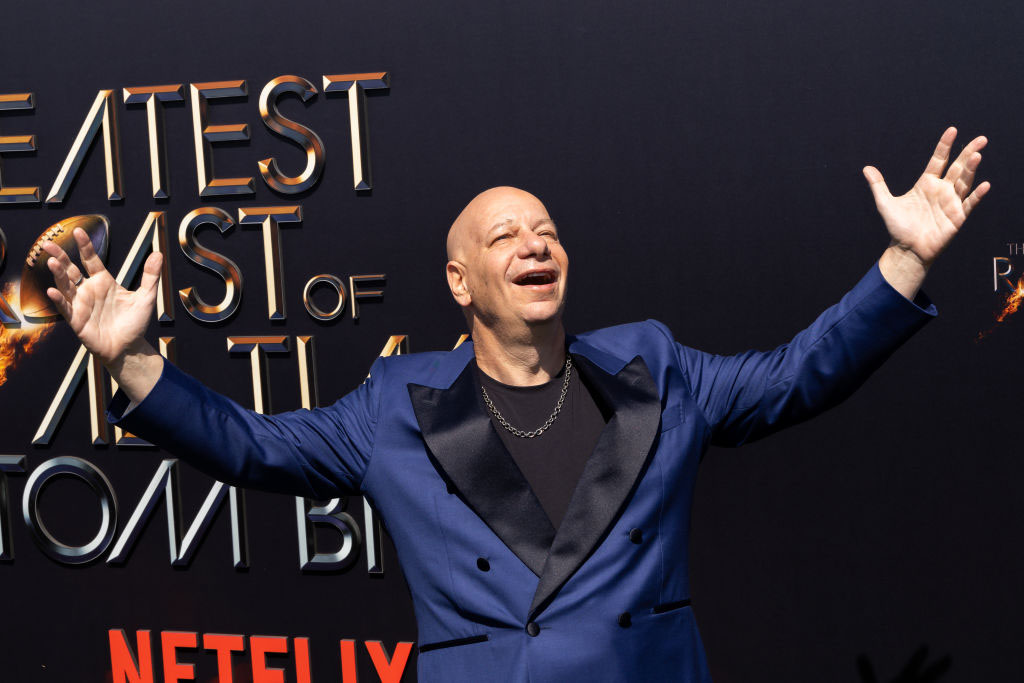You expect a comedian to make you laugh. If it’s a superstar like Seinfeld or Chapelle, you expect to really, really laugh. And if a serious bit occasionally comes up, it’s usually as a set-up for a killer joke.
The point is always the joke.
There’s an implicit contract between the comic on stage and the folks who shlepped to the show: You’re here to make us laugh, and we’re here to laugh.
Because laughing is such a fantastic thing, we’re all grateful for this contract. I mean, seriously: How many pleasures in life can compete with an honest-to-goodness belly laugh?
For many years now, Jeff Ross has lived at the epicenter of these belly laughs. As “America’s Roastmaster” skewering some of the country’s biggest celebrities, he’s made audiences laugh both nervously and hysterically. There’s that mischievous sparkle in his eyes that tells us why he’s there: to get big laughs. Full stop. End of story.
That’s why I was somewhat stunned to see his one-man show the other night, “Take a Banana for the Ride,” written by Ross and directed by my friend Stephen Kessler. I was expecting the show would take me on a joy ride of uninterrupted laughter. And in many ways, it did.
But Ross also did something one rarely sees from a stand-up comic (and I inhale comedy as a hobby). When he brought up the serious stuff, it wasn’t as a set-up for a joke. It didn’t feel manipulative. The serious stuff came from deep in his heart, not from his clever comic brain.
Because he married these serious bits about his life with super funny bits, he made them somehow co-exist, which is how the show ended up touching both our hearts and our comic genes.
“Take a Banana” revolves around Ross’s life story, including his unlikely entry into comedy and what he learned from those who influenced him, from his parents to his grandfather to his sister to his best friends to his dogs. He doesn’t hold back: A father who does cocaine; an MC who tries to molest him; the many abortions he paid for; cancer surgery on his colon, etc.
But while you’re processing the serious stuff, he stuns you with something crazy funny (“I now have a semi-colon”) that almost feels surreal because the serious stuff itself was so real.
When he tells the story of the disgusting molester, he ends it by including him among the friends who showed up to the show. As abhorrent as the story was, that exclamation point was achingly funny.
He touched our hearts with his rescue of two sickly German Shepherds, but then made us howl with laughter as he imitated them in a Nazi accent asking for their treats.
Because Ross is so darn sincere about his life stories and the emotional impact they’ve had on him, he gets away with the occasional schmaltz. When he throws in, for example, a life lesson about “always moving forward” or “developing a thick skin,” you accept it because it’s clear he means it and wants us to benefit from his experience.
You accept it also because your stomach is still hurting from the laughs.
I won’t give away too much, but I’ll just say that the stories are unusually touching, especially those with his grandfather Jack (the source for the “banana” title.) By using old video footage and family photos, as well as old letters that he reads out in full, Ross accentuates the authenticity he’s brought to the storytelling.
He threw a couple of curve balls the audience probably didn’t expect. The first was when he led off the show with a musical pastiche around the idea of “Don’t F**k with the Jews.” While the rest of the show dealt with intimate life stories, this bit touched on something historical and consequential– what is often called “the world’s oldest hatred.”
Ross drew on his childhood growing up in a tough New Jersey neighborhood to challenge the stereotype of the weak, nerdy Jew. He had tough uncles. He himself got a black belt in karate. Yes, Ross informed the audience, there’s such a thing as badass Jews.
Then he took it up a notch. Instead of apologizing for Jewish success (as so many Jews do), he doubled down and flaunted the countless innovations his people have brought to the world. Who’d want to f**k with that?
The Jewish bit was risky but also electric, and it worked because the way Ross did it was, again, really funny.
The second curve ball came at the end. Just as the audience was expecting a dramatic finale to his life story, he shifted gears and morphed back into “America’s Roastmaster.” He invited people to come on stage for the pleasure of being roasted (humiliated?) by America’s premier roaster.
There was a subtle but important shift that occurred. Up until then, while Ross performed as naturally as a jazz musician, there was never a sense that he was improvising. The show captured a complicated life full of emotional and painful turns around specific events and people. That’s not something you improvise.
The roast, however, was all improv. It was the Ross everyone knew, which meant he’d risk disrupting the carefully calibrated crafting of the show.
But the disruption itself was all Ross, in keeping with one of the show’s lessons that life always throws us curve balls.
As with the rest of the show, Ross pulled off the roasting by being super funny while also exposing his humanity. As the audience and the roastees cracked up, he threw in these little remarks that reminded us this man’s heart is always in the right place.
Remarks like “it’s important that we’re able to laugh at ourselves” or a confession that being onstage in front of people he’s moved gives him the greatest pleasure. What’s more heartfelt than that?
By the time Ross took off his shirt during the grand finale to reveal his fulsome belly, the audience had surrendered to his humanity and couldn’t help but stand up and applaud.
A seriously generous and moving comedian had shown up and made us really, really laugh.




